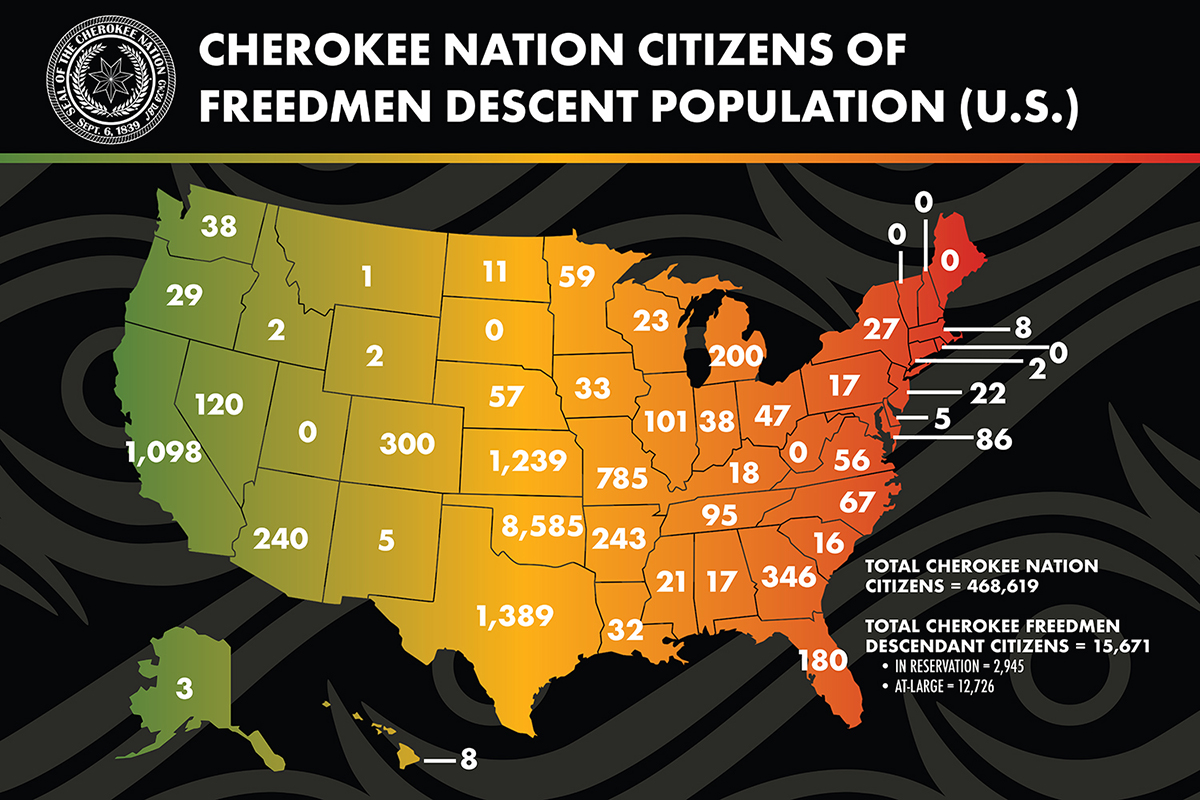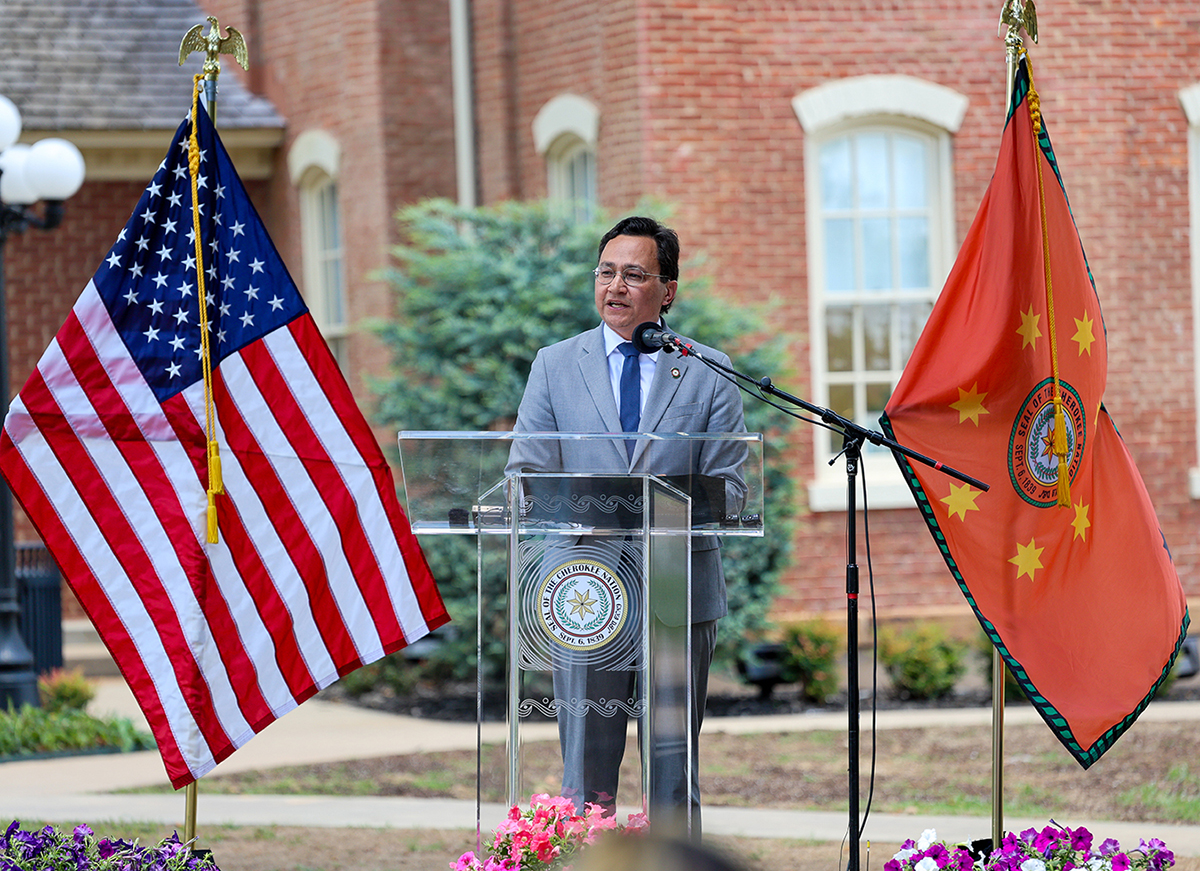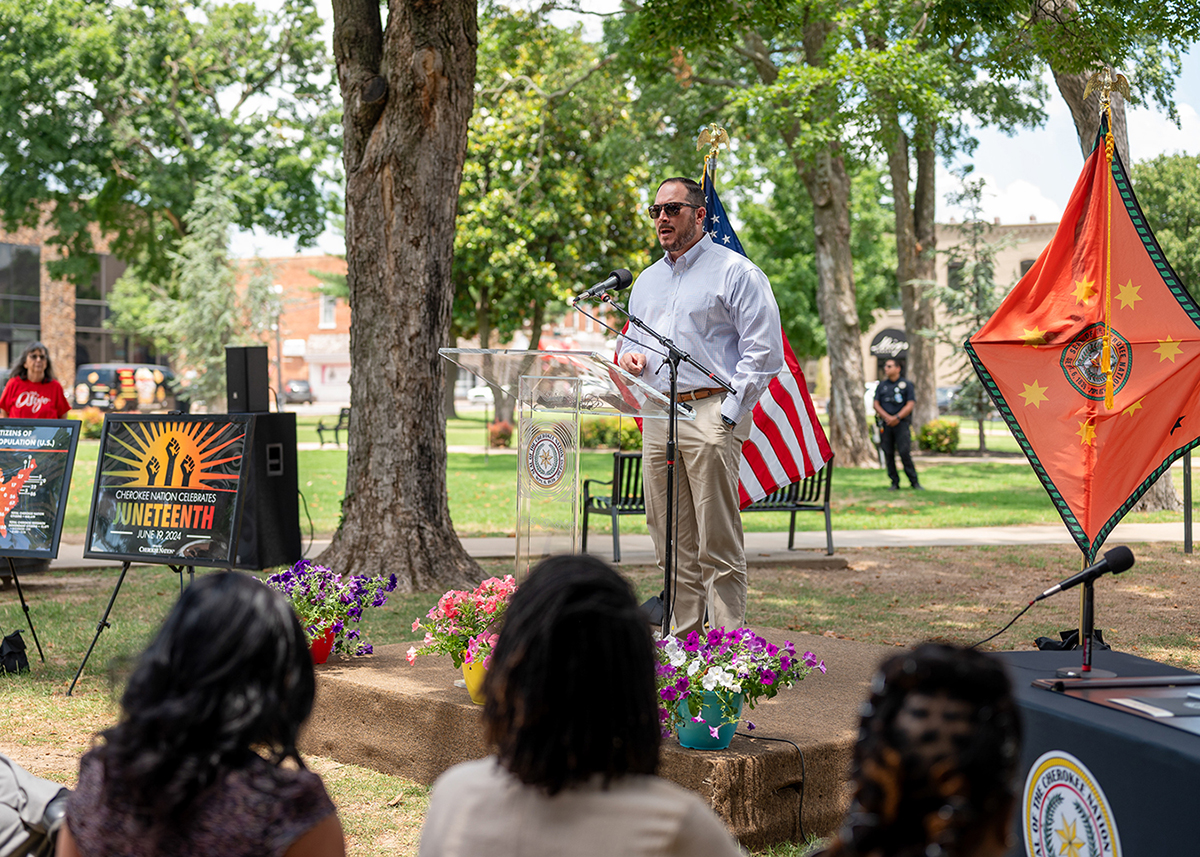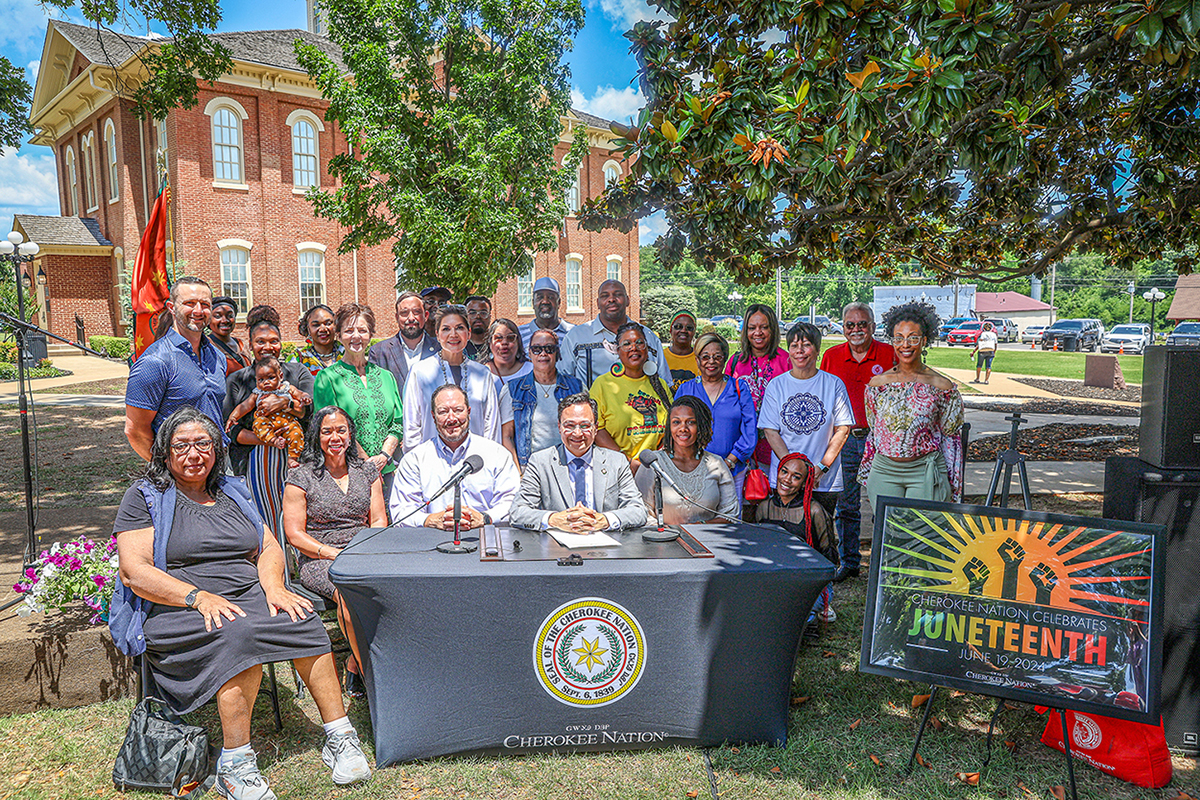TAHLEQUAH, Okla. — Cherokee Nation leaders gathered with Cherokee citizens Wednesday, June 19, to celebrate Juneteenth in historic downtown Tahlequah and release the findings of a recent task force report on equality.
Principal Chief Chuck Hoskin Jr. and Deputy Chief Bryan Warner in February asked the task force members to identify the level of tribal services being utilized by Cherokee citizens of Freedmen descent and to provide recommendations on how the tribe can make improvements.
“We must continue to talk about the facts related to our history, and that’s part of what Juneteenth is about. On July 19, 1866, Cherokee Nation signed the treaty known now as the Treaty of 1866 giving people enslaved under our former laws, and all of their descendants, ‘all the rights of native Cherokees.’ The Treaty of 1866 didn’t say ‘some’ of the rights of native Cherokees; it didn’t say, ‘some of the rights, some of the time,’ and most assuredly, the Treaty of 1866 doesn’t say that Cherokee descendants have to beg for their rights at the ballot box. That’s a true statement, and we need to say it every chance we get. Equality is the order of the day at the Cherokee Nation. The work toward equality and freedom goes on at the Cherokee Nation. We seek to give deeper and broader meaning to Juneteenth.”

In 2020, Chief Hoskin signed an Executive Order on Equality, reiterating Cherokee Nation’s commitment to equal protection and equal opportunity under Cherokee law. In February 2024, Chief Hoskin expanded the executive order to and created a task force to study whether Cherokee citizens of Freedmen descent are provided equal access to tribal programs and services.
Since then, the task force gathered data and worked to identify where gaps in services may exist, and to propose strategies that will help to address any deficiencies for Cherokee citizens of Freedmen descent.
“The Executive Order on Equality sets forth the tone and the substance that we need to keep making progress on equality. This task force created a report that is revealing and informs our efforts, informs the efforts of this government, going forward. There are areas where we are meeting the mark when it comes to meeting the obligations of citizenship available to Freedmen, and there are areas where we are falling short,” Chief Hoskin said. “As proud as we are of all of the efforts we have made to ensuring we serve all citizens of the Cherokee Nation, Deputy Chief Warner and I are not afraid to take a critical look at what we do. On the issue of Freedmen and equality, we believe firmly that we cannot hope to heal if we close our eyes to the history of slavery, if we close our eyes to the consequences of slavery. We cannot make progress if we are unwilling to examine whether our efforts at healing today are adequate. This task force report gives us some important answers, and some guidance, and challenges us to ask even more questions.”
The task force worked with the Cherokee Nation Registration department and determined there are more than 15,600 Cherokee citizens of Freedmen descent living across the country, including nearly 3,000 inside the tribe’s reservation and more than 12,700 living at-large.
“With these findings from the Task Force on Equality, Cherokee Nation can better identify the gaps that exist today and make more informed decisions that not only better the experience for Cherokee citizens of Freedmen descent, but the tribe as a whole,” Deputy Chief Warner said. “I’m thankful for the individuals on the task force who took this project to heart and worked hard to have what, at times, may have been difficult discussions. Equality for all Cherokee Nation citizens is a critical part of how we should be serving, and this report will help us do just that.”

Cherokee Nation Freedmen Community Liaison Melissa Payne led the task force along with Secretary of State Shella Bowlin, Deputy Secretary of State Canaan Duncan, Cherokee Nation Registrar Derrick Vann, Cherokee Nation Environmental Protection Commission Member Marilyn Vann, Chief Information Officer Paula Starr, and Director of Self Governance Ashawna Miles.
“I’m truly grateful we have leadership that is just as passionate about our ancestors as we are, and the importance of sharing history so that the healing process can continue amongst all Cherokee citizens,” Payne said.
The task force concluded that while Cherokee citizens of Freedmen descent represent more than 3.3% of overall tribal citizenship, including more than 2% of the overall Cherokee population within the reservation, some tribal programs see less than 2% Freedmen participation through programs being offered to tribal citizens. The task force report concludes that many Cherokee citizens of Freedmen descent remain unaware of certain tribal programs and services for which they may qualify.
Among the task force’s recommendations to address these concerns are that tribal departments work to ensure inclusion and provide additional resources to support outreach to Cherokee citizens of Freedmen descent, along with developing initiatives that raise awareness about the history and contributions of Freedmen descendants within the Cherokee Nation.
The task force also suggested the creation of a resource team that includes representatives of Freedmen descendants who can guide citizens seeking information on services that may be available to them. Other recommendations included simplifying the application processes for programs and services in order to make them more accessible, and implementing a monitoring and evaluation framework to regularly assess the effectiveness of outreach efforts and participation rates.

Cherokee Nation’s Juneteenth celebration, held June 19 outside of the Cherokee National History Museum in the heart of the tribe’s capital city, is available to watch online at https://www.youtube.com/watch?v=PiMbTjswN6A.
Along with remarks by Chief Hoskin and Deputy Chief Warner, the celebration also included remarks by Cherokee Nation Secretary of State Shella Bowlin, Deputy Secretary of State Canaan Duncan, community liaison Melissa Payne, and a poem by Cinda Rose. After remarks, Chief Hoskin signed a proclamation declaring Juneteenth in the Cherokee Nation.

